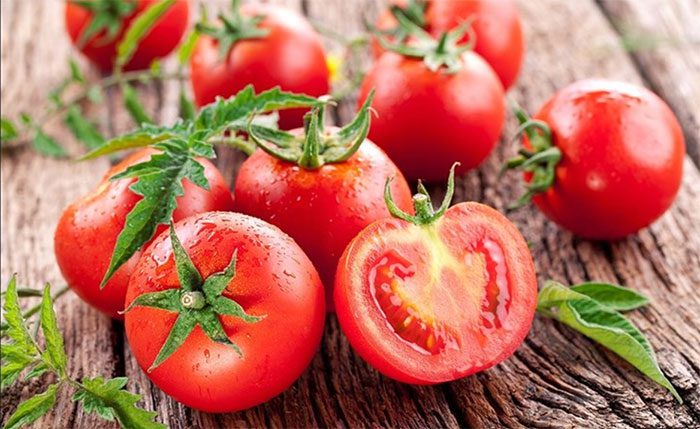Tomatoes are highly nutritious. This fruit is rich in vitamin A, C, K, vitamin B6, potassium, folate, thiamine, magnesium, niacin, copper, and phosphorus… The wonderful thing about tomatoes is that they contain very little cholesterol, saturated fat, sodium, and calories, yet are rich in the cancer-fighting antioxidant Lycopene.
However, it is important to remember that the “golden substance” Lycopene only appears in ripe tomatoes. Other nutrients also peak when tomatoes are ripe, rather than in green or under-ripe tomatoes.

Tomatoes have a positive impact on certain types of cancer.
In contrast, green tomatoes, which are not fully ripe, contain solanine. This is a potent toxin that can severely harm the human liver. Symptoms of poisoning from eating green tomatoes often include nausea, vomiting, salivation, weakness, fatigue, and other symptoms… in severe cases, it can be life-threatening.
Green tomatoes also contain many alkaloids that are harmful to health. Eating under-ripe tomatoes can reduce their nutritional value and flavor, making them less visually appealing. However, as tomatoes ripen, the harmful substances decrease and disappear. Furthermore, their cancer-fighting, skin, and hair beautifying effects reach their peak.
Ripe Tomatoes Fight Cancer
Numerous studies have demonstrated that tomatoes truly have a positive impact on certain cancers. This is primarily due to a compound called Lycopene, which is abundant in ripe tomatoes. Lycopene is a bright red carotenoid pigment and a phytochemical found in many fruits and vegetables, including tomatoes.
Lycopene is an antioxidant – it combats molecules known as free radicals that can damage cells and affect your immune system. Tomatoes are among the foods with the highest concentration of Lycopene. Each 100g of dried tomatoes contains up to 45.9mg of Lycopene, while fresh tomatoes contain about 21.8mg.
In terms of cancer-fighting mechanisms, Lycopene primarily acts as a strong antioxidant that protects your body from damage caused by compounds known as free radicals. The antioxidant properties of Lycopene can help maintain balanced levels of free radicals, protecting the body against many chronic diseases and slowing or inhibiting the growth and spread of cancer cells.
A notable recent study on this topic comes from a group of scientists at the Clinical Nutrition Department of the Maria Skłodowska-Curie National Cancer Research Institute in Poland. It shows that Lycopene-rich foods like tomatoes may reduce the risk of lung, stomach, or prostate cancer. Some studies suggest they may help prevent diseases of the pancreas, colon, throat, mouth, breast, and cervix.

Ripe red tomatoes are believed to be the richest source of cancer-fighting Lycopene. (Illustrative image).
Researchers at the University of Portsmouth (UK) studied the ability of Lycopene to slow the development of breast and prostate cancer. It disrupts signaling pathways that typically promote tumor growth. In the U.S., the MD Anderson Cancer Center, North Central Cancer Treatment, and the Northern Central Cancer Treatment Group (NCCTG) have also conducted numerous clinical studies. The results consistently indicate that Lycopene from tomatoes significantly supports the reduction and inhibition of prostate cancer by an average of 15% compared to those who do not consume it.
Another study involving 46,000 American men over 20 years found a significant correlation between high Lycopene intake and a reduced risk of prostate cancer. This research was published in the American Journal of Clinical Nutrition. Additionally, a study from Harvard Medical School (USA) found that consuming tomatoes and tomato products such as tomato sauce and pizza more than twice a week reduced prostate cancer risk by 21% to 34%.
Although “Lycopene” is named after tomatoes, it is not exclusive to them. It can also be found in other red fruits and vegetables such as watermelon, papaya, red guava, red grapefruit, and pink grapefruit, but is absent in strawberries and cherries. Furthermore, the polyphenols and vitamin C in tomatoes also play a significant role in cancer prevention, mainly by slowing oxidation, providing anti-inflammatory effects, and preventing tumor formation.
Ripe Tomatoes Enhance Skin and Hair Beauty
In reality, tomatoes themselves do not contain direct components that whiten or prevent hair loss. However, due to their high vitamin C content, consuming ripe tomatoes or applying ripe tomato masks frequently can have skin-enhancing effects, though perhaps not as much as we might think.
Vitamin C is an antioxidant that helps protect the skin from damage caused by free radicals, thereby reducing the risk of wrinkles and dark spots. Additionally, vitamin C can promote collagen synthesis, enhancing the skin’s elasticity and firmness. However, according to the “Chinese Food Composition Table (6th Edition, Volume 1),” the vitamin C content in tomatoes is not very high, at only 14 mg/100g. Other vegetables, like cabbage, bell peppers, and various colored peppers, contain more vitamin C than tomatoes.
Therefore, the skin-whitening effect of tomatoes is not very significant. However, they can help hydrate and firm the skin. Additionally, a study published in Scientific Reports found that tomatoes may help protect against UV rays and reduce the risk of sunburn. This is due to tomatoes’ high carotenoid content, a component of Lycopene. Nonetheless, scientists also warn that one cannot solely rely on eating tomatoes instead of sunscreen; to avoid skin darkening, one must still effectively manage sun protection.

Tomatoes are also a popular fruit in beauty. (Illustrative image).
Ripe tomatoes also benefit hair health. Specifically, when ripe, the vitamin A content in this fruit is high, helping your hair become stronger, shinier, and less prone to breakage. However, it must be emphasized that tomatoes do not possess superpowers to make thin hair fuller; they can only improve existing hair conditions and reduce breakage afterward.
In addition to their positive effects on cancer, skin, and hair, ripe tomatoes are considered a treasure for health due to their many other benefits. Notably, they are good for the eyes, protect cardiovascular health, and reduce oral diseases…
A recent study published in the journal Advances in Nutrition showed that individuals who consume Lycopene have a lower risk of heart disease, diabetes, and stroke. Additionally, Lycopene may help lower levels of “bad cholesterol” and has a positive effect on lowering blood pressure. This compound has also been studied by a group of American professors led by Chandra and his colleagues, published in Nutrition, indicating that it can combat gingivitis and periodontitis thanks to its antibacterial and antifungal properties.


















































